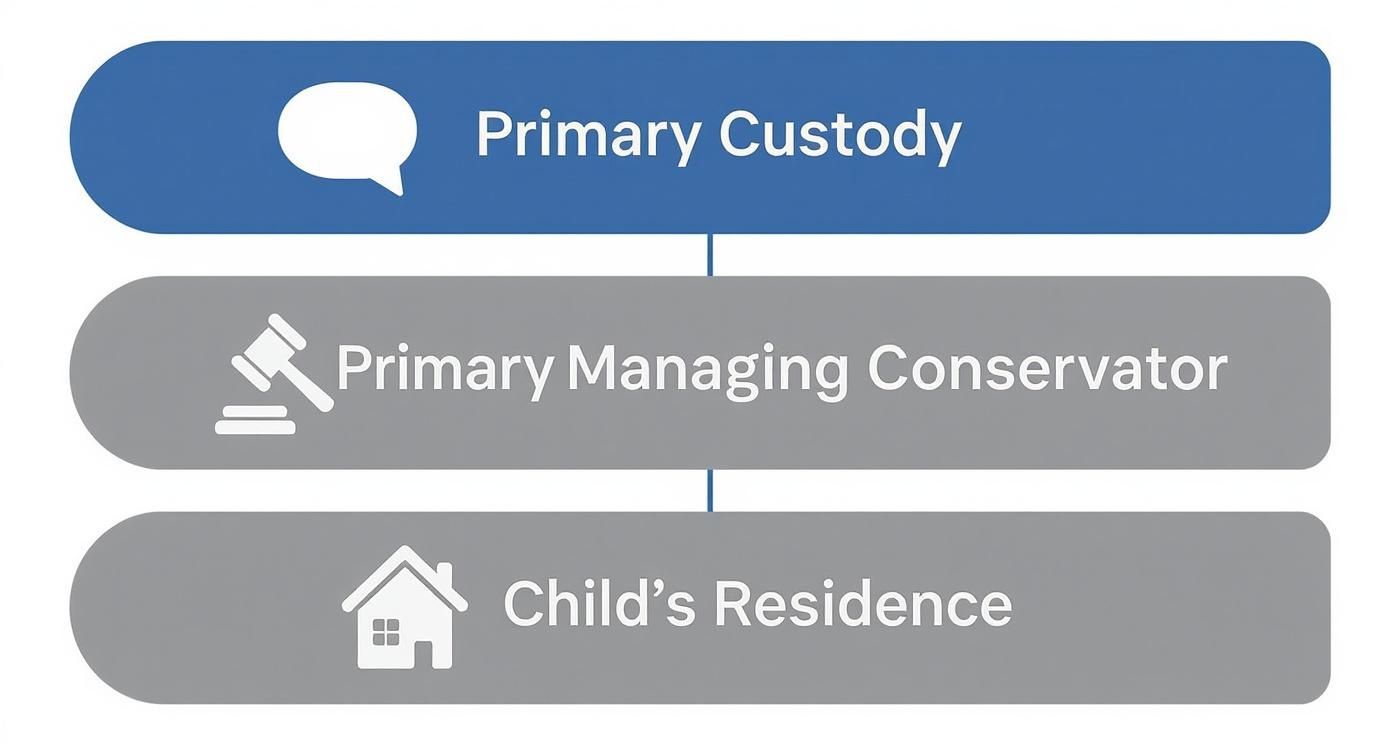When your child’s future is on the line, understanding your rights isn't just important—it's everything. In Texas, the term “primary custody” isn’t what most people think. It’s a common phrase for a very specific legal role called the Primary Managing Conservator.
This isn't just about winning or losing in court. It's about securing the legal right to decide where your child lays their head at night and building a stable, loving foundation for their future.
Translating "Primary Custody" for Texas Parents
If you're heading into a custody case, the legal jargon can feel overwhelming. Friends and family might talk about “sole custody,” “full custody,” or “primary custody.” While everyone understands these phrases in conversation, they don’t quite line up with the official terms used in the Texas Family Code.
Knowing the difference is more than just a technicality; it’s critical for protecting your parental rights and clearly communicating your goals.
In Texas, the entire legal framework for custody is called conservatorship. Think of it as a bundle of rights and responsibilities assigned to each parent for the care of their child. The court’s goal isn’t to pick a winner, but to create a stable, supportive environment that serves the best interest of the child.
Why Texas Terminology Matters
Using the correct legal terms empowers you. It helps you communicate clearly with your attorney, the other parent, and, most importantly, the judge. When you use a term like “primary managing conservator” instead of just “primary parent,” it shows that you’re informed and serious about your role in your child's life.
This clarity helps you cut through the confusion and focus on what really matters: defining your rights and securing your child’s well-being. The infographic below breaks down how this common phrase connects to the official legal one.

As you can see, the everyday idea of "primary custody" translates directly to the legal status of Primary Managing Conservator. The most significant right that comes with that title is determining where the child lives.
To make things even clearer, let's break down how common custody terms translate into the language a Texas court actually uses. This will help you understand exactly what you're asking for and what the final order will mean for your family.
Common Custody Terms vs. Texas Legal Terms
| Common Term | Official Texas Legal Term | What It Means for You |
|---|---|---|
| Primary Custody | Primary Managing Conservator | You have the exclusive right to decide the child's main residence. |
| Non-Custodial Parent | Possessory Conservator | You have visitation rights (a possession schedule) but don't decide where the child lives. |
| Joint Custody | Joint Managing Conservators | Both parents share decision-making rights, but one is still named the Primary. |
| Sole Custody | Sole Managing Conservator | You have the exclusive right to make most major decisions for the child, which is rare. |
Understanding this table is a huge step forward. It equips you to read court documents, participate in mediation, and advocate for your child with confidence.
Key Takeaway: The single most important power of the Primary Managing Conservator is the exclusive right to designate the child's primary residence, often within a specific geographic area ordered by the court.
Grasping this fundamental concept is the first real step in building a strong case. It shifts the focus from a vague idea of "having custody" to a precise understanding of your legal role and the specific rights you are fighting to secure for your child’s future.
The Rights and Duties of the Primary Managing Conservator

Being named the primary managing conservator is about so much more than just having your child live with you most of the time. Think of it less as a title and more as a specific set of legal responsibilities—a roadmap designed to give your child a stable, predictable home life.
Understanding these rights and duties is crucial. They are the bedrock of your child's day-to-day world and will shape your co-parenting relationship for years to come.
Exclusive Rights Granted to the Primary Parent
Under the Texas Family Code, the parent designated as primary holds several exclusive rights. These are powers that only this parent can exercise, creating a clear point person for some of life’s biggest decisions. This parent essentially becomes the "home base" for the child, responsible for the core parts of their upbringing.
While most rights are shared between parents in a joint conservatorship, the primary parent typically has the final say in a few key areas. They have the exclusive authority to:
- Designate the child's primary residence. This is the most significant right. It's the power to decide where your child lives, though it's usually limited to a specific geographic area set by the court.
- Receive child support payments. You are the parent entitled to receive financial support from the other parent on the child's behalf.
- Consent to non-invasive medical and dental care. This covers routine check-ups, cleanings, and other minor treatments that don't require surgery.
- Make decisions about the child's education. While the other parent has every right to be involved, you often get the final call on which school the child attends if you cannot agree.
These exclusive rights are in place for a reason: they ensure a clear decision-maker is in charge of a child's day-to-day stability, which helps prevent confusion and arguments.
Important Duties and Responsibilities
With these powerful rights come significant duties. The court expects the primary parent to do more than just provide a roof over the child's head and food on the table. Your job is to actively build a nurturing environment that supports every facet of your child’s well-being.
A primary parent's most important duty is to provide a safe, stable, and loving home. This includes not only physical care but also actively encouraging and supporting the child’s relationship with the other parent.
That last part is critical. You are legally—and morally—obligated to make sure the other parent remains an active and involved part of your child’s life. Sabotaging that relationship is a major misstep in the eyes of the court and can harm your case.
Historically, custody awards sometimes showed a gender disparity. However, Texas law is crystal clear that these decisions must be gender-neutral. While a detailed study shows that fathers still represent a smaller percentage of primary parents nationally, Texas courts are focused on who is the better parent, not their gender.
Ultimately, being the primary parent is a position of trust. It demands a deep commitment to your child's best interests, and that absolutely includes honoring and facilitating their bond with both parents. The way you handle this role sets the tone for your family’s future, and a cooperative spirit is almost always the key to a happy, well-adjusted child.
How Texas Courts Decide Who Becomes The Primary Parent

For any parent, the idea of a judge making decisions about their child's future can be incredibly stressful. It’s easy to get lost in worry, but Texas courts don't operate on a whim. Every decision is guided by one powerful, overarching principle: the best interest of the child. This is the North Star of every custody case.
Many parents, especially dads, walk into court worried about bias. But the Texas Family Code explicitly prohibits judges from making custody decisions based on a parent's gender. A father has every right to be the primary parent, just as a mother does. The law demands a level playing field.
The court's decision isn't based on gut feelings or assumptions. Instead, judges rely on a well-established set of guidelines known as the “Holley Factors” to get a clear picture of what will truly serve the child’s best interests.
The Holley Factors Explained
The Holley Factors are a framework a judge uses to see the whole story of your child's life. The court will dig into everything from a child's day-to-day emotional needs to each parent’s ability to create a stable, supportive home. Knowing these factors helps you understand what evidence truly matters in your case.
Here are a few of the key areas a judge will scrutinize:
- The child's needs: This covers their physical, emotional, and developmental needs, both now and for the future.
- Parental abilities: The court will assess each parent's capacity to provide a safe, stable, and nurturing environment.
- Stability of the home: A judge looks for consistency and predictability—things that help a child feel secure.
- Parent-child relationship: The strength of the existing bond between each parent and the child is a major consideration.
- Any history of danger: Any evidence of family violence, neglect, or substance abuse will be weighed very heavily against a parent.
By building your case around these practical points, you can show the court, with facts, how you meet your child's needs. For a deeper dive, check out our guide on understanding Texas custody and the Holley Factors in our guide.
Your Character and Conduct Matter
When a Texas court decides who will be the primary parent, character and conduct go under the microscope. The judge is looking for the parent who can provide a positive, healthy, and responsible environment. This means that personal conflicts and accusations can absolutely become part of the proceedings.
If you find yourself defending against false statements that could tarnish your reputation in court, knowing how to prove defamation can be a critical part of your legal strategy. Protecting your character is a key part of protecting your relationship with your child.
Key Takeaway: A judge's decision is never arbitrary. It’s a structured evaluation based on the Holley Factors, designed to pinpoint the parent who can best provide a safe, stable, and loving environment for the child, regardless of gender.
Ultimately, the court wants to see which parent is best equipped to put the child’s needs ahead of their own. When you prepare your case around these established legal standards, you present a clear, compelling argument for why you should be named the primary managing conservator.
Understanding Joint Managing Conservatorship
One of the biggest myths we hear from parents is that the "primary" parent holds all the power and makes every decision alone. In Texas, that couldn't be further from the truth. In fact, Texas law starts with the presumption that a Joint Managing Conservatorship (JMC) is what’s best for the child.
Think of a JMC as a legal co-parenting partnership. It’s the court’s way of ensuring both parents remain central, legally protected figures in their child’s life. This framework encourages cooperation and shared responsibility long after a divorce or separation is finalized.
Shared Rights in a Co-Parenting Partnership
Under a JMC, most of the crucial rights and responsibilities for raising your child are shared equally between you and the other parent. Just because one parent gets to decide where the child lives doesn't mean the other parent is sidelined. Instead, you are legally expected to work together on the big-picture decisions that will shape your child’s future.
Both parents typically have the right to:
- Make joint decisions about the child's education.
- Consent to non-emergency, invasive medical procedures.
- Make decisions concerning the child's religious and moral upbringing.
- Access the child's medical, dental, and educational records.
This structure is specifically designed to keep both parents actively involved. The goal is always collaboration for the child’s sake. For a complete breakdown, you can learn more about how joint custody works in Texas in our detailed guide.
To give you a clearer picture, let's compare the roles side-by-side.
Comparing Parental Rights in a Texas JMC
In a standard Joint Managing Conservatorship, certain rights are exclusive to the primary parent, while most are shared. Here’s a quick breakdown of how these duties are typically divided.
| Right or Duty | Primary Managing Conservator | Joint Managing Conservator (Non-Primary) |
|---|---|---|
| Designate Child's Residence | Exclusive Right: Can establish the child's main home within a specific geographic area. | Shared Duty: Must follow the geographic restrictions set by the court. |
| Receive Child Support | Exclusive Right: Receives payments on behalf of the child. | Duty: Obligated to pay court-ordered child support. |
| Make Educational Decisions | Often Shared: Both parents must typically confer and agree on major school choices. | Often Shared: Has the right to participate in decisions unless one parent is granted exclusive authority. |
| Consent to Medical Care | Shared Right: Both parents can consent to non-invasive, routine care. Major procedures require joint agreement. | Shared Right: Both parents have the authority to consent to medical and dental treatment. |
| Access to Records | Shared Right: Both parents have full access to school, medical, and psychological records. | Shared Right: Entitled to access all of the child's important records. |
| Attend School Activities | Shared Right: Both parents are entitled to attend school functions and parent-teacher conferences. | Shared Right: Can fully participate in the child's school life. |
This table shows that while the primary parent has the key role of establishing the home, the non-primary parent remains a fully empowered co-parent in almost every other significant area of the child’s life.
Why JMC is the Standard in Texas
Why does Texas lean so heavily toward a JMC? The legal preference comes from a simple but powerful belief: a child benefits immensely from having two active and engaged parents. It legally validates the emotional and psychological importance of both mothers and fathers in a child's development.
The Texas Family Code is explicitly gender-neutral. Courts are far more focused on parental fitness and involvement, not gender stereotypes.
Key Takeaway: A Joint Managing Conservatorship empowers both parents to share fundamental decision-making responsibilities, ensuring the non-primary parent maintains a significant and legally protected role in the child’s life.
This cooperative model helps reduce conflict by giving both parents a voice. It reinforces that even though one parent is "primary," raising a happy, healthy child is a team effort. Ultimately, this legal structure provides a foundation for a stable and supportive co-parenting relationship—which is truly what is in your child's best interest.
Possession Orders and Geographic Restrictions

Once a judge names a primary parent, the next question is always a practical one: When do I get to see my kids? Knowing who has “primary custody” is one thing, but the real-world schedule of pickups, drop-offs, and holidays is where your legal order truly comes to life.
In Texas, this schedule is laid out in a document called a possession order. Think of it as a detailed calendar for your co-parenting life. It's designed to create predictability for your child and minimize conflict between you and the other parent by leaving very little up for debate.
The Texas Standard Possession Order
For most families living less than 100 miles apart, Texas courts start with a template schedule called the Standard Possession Order (SPO). The law presumes this schedule is in the child’s best interest because it provides a consistent, reliable routine—something children desperately need during a time of change. It's the most common visitation arrangement in Texas.
A typical SPO gives the non-primary parent possession of the children on:
- The first, third, and fifth weekends of the month.
- Alternating major holidays, like Thanksgiving and Christmas, every other year.
- An extended period during the summer, usually 30 days.
This framework is built to ensure the non-primary parent remains a strong, consistent presence in their child’s life. It protects both parents' time with their children and fosters a healthy ongoing relationship.
For a deep dive into the specifics, you can check out our comprehensive guide to child visitation and possession orders in Texas.
Why Geographic Restrictions Are Crucial
One of the biggest fears for any non-primary parent is that their ex will pack up and move hours away, making it nearly impossible to see their child regularly. To prevent this, nearly every Texas custody order includes a geographic restriction.
This is a court-ordered boundary that dictates where the primary parent must establish the child's residence.
A geographic restriction is a powerful tool that protects the non-primary parent’s relationship with their child. It ensures that distance doesn’t become a barrier to frequent and meaningful contact.
Typically, this boundary is set to the county where the divorce was filed plus any surrounding counties. If the primary parent wants to move outside this designated area, they can't just pack up and go. They need either written permission from the other parent or a new court order. Proving that uprooting a child is in their best interest is a tough legal battle, which is why this restriction is such a critical protection for co-parents.
Your Next Steps in a Texas Custody Case
Navigating the Texas family court system can feel overwhelming, but gaining clarity is the first step toward moving forward with confidence. The legal road ahead isn't easy, but it rewards preparation, focus, and a solid understanding of your parental rights.
Always frame your arguments around the best interest of the child. Use correct Texas legal language like conservatorship and possession order. And begin gathering evidence now—anything that shows you provide a stable, loving, and consistent home for your child.
Key Takeaway: What You Should Do Next
- Focus on the Child: Every decision and piece of evidence should connect back to your child's well-being and stability.
- Learn the Language: Use terms like "Joint Managing Conservator" and "Standard Possession Order" to show the court you are informed.
- Document Everything: Keep a clear record of your involvement in your child's life, from school events to doctor visits. Strong organization is your best asset. For helpful tips, see this guide on how to organize legal case files efficiently.
- Seek Legal Guidance: You don't have to face this alone. An experienced family law attorney can protect your rights and help you build the strongest possible case.
At the end of the day, protecting your relationship with your child is the most important job you have. The good news is, you don’t have to face this challenge alone. Seeking expert legal guidance is a powerful, proactive step toward securing your child’s future and ensuring your voice is heard.
Common Questions About Primary Custody in Texas
When you're dealing with a custody case, the questions can feel endless. Below, we've tackled some of the most common ones we hear from Texas parents, giving you the straightforward answers you need.
Can the Primary Parent Move Out of State With Our Child?
Not without permission. Almost every Texas custody order contains a geographic restriction, a legal boundary that defines where the primary parent must live. If that parent wants to move outside the specified area, they need either a signed, written agreement from the other parent or a new court order proving the move is in the child's best interest. This is a crucial safeguard for the non-primary parent's relationship with the child.
Does Being Primary Mean I Make All the Decisions?
No, not usually. While you get the exclusive right to decide where your child lives, most other big decisions are shared between both parents under what's called a Joint Managing Conservatorship. Your final court order will spell everything out, specifying which rights belong to you alone and which ones—like decisions about schooling and non-emergency medical care—must be made together.
Can a Custody Order Be Changed Later On?
Yes. Custody orders aren't set in stone and can be modified. To change which parent is primary, you must prove two things to the court. First, that there has been a material and substantial change in the circumstances of the child or one of the parents. Second, you must prove that changing the primary parent would be in the child’s best interest.
If you need help with a child custody or visitation case in Texas, our experienced attorneys can guide you every step of the way. Contact The Law Office of Bryan Fagan, PLLC today for a free consultation.

